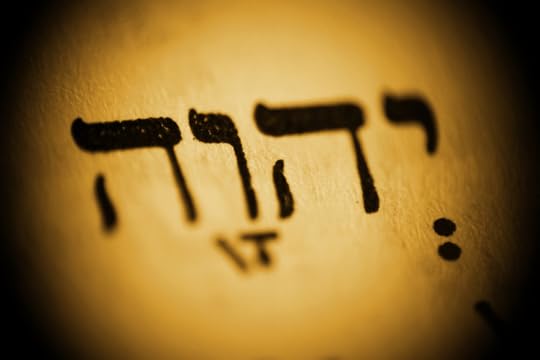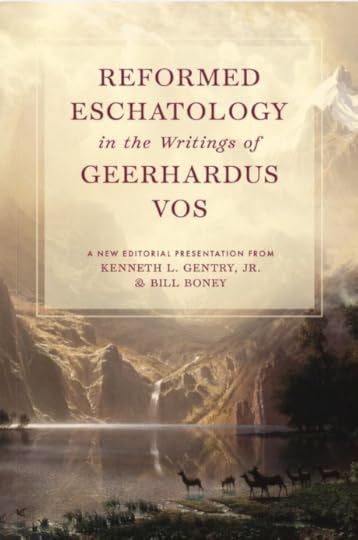YAHWEH
 PMW 2024-089 by Kenneth L. Gentry, Jr.
PMW 2024-089 by Kenneth L. Gentry, Jr.
In Hebrew God’s distinctive covenant name appears as four consonants: YHWH (pronounced Yahweh). It appears in English versions in all caps as: LORD (or sometimes GOD when linked with Adonai, which also is translated “Lord”). In Exodus 3:14 God defines himself via his special covenantal name. This name is so significant in redemptive history that the Scriptures can simply mention “the name” (Lev. 24:11, 16). God jealously declares that this is his name “forever” (Exo. 3:15; cp. Psa. 102:12; 135:13).
This name first appears, not in Gen. 1 where God’s power is exhibited (therefore, Elohim appears there). Rather it appears first when the LORD lovingly creates then covenants with Adam (see note at Gen. 2:4). Contrary to critics, it does not represent another and competing tradition about who the God of Israel is, but is used in his revelation from the beginning.
This revelation certainly is not of a new name developed here. After all, why would Moses go to a people who are asking who sent him, then give them a name they had never heard before? Rather it is being urged here to establish Moses’s authoritative call to lead them. Besides in vv. 15–16 we see that it is his name “forever” and was used with the God of “your fathers.” In fact, it appears in Genesis 162 times, with thirty-four of those times being spoken by actors in the Genesis drama, not just Moses as the narrator.

As It Is Written: The Genesis Account Literal or Literary?
Book by Ken Gentry
Presents the exegetical evidence for Six-day Creation and against the Framework Hypothesis. Strong presentation and rebuttal to the Framework Hypothesis, while demonstrating and defending the Six-day Creation interpretation.
See more study materials at: www.KennethGentry.com
Here in Exodus 3:14 he explains his name as meaning “I am that I am.” This self-designation is peculiarly important to our understanding of God’s covenant love. This name-statement is found in the imperfect tense in Hebrew, thereby emphasizing a constantly manifested quality. It is a very active name. Jewish Hebrew scholar Umberto Cassuto comments: “There is also implicit in this interpretation the thought of implementing the promises: I am who I am always, ever alike, and consequently I am true to My word and fulfil it.”
The name and its meaning is enormously important for this very moment in Moses’s life and Israel’s history. For he is going to lead Israel out of Egypt by confronting the most powerful ruler in the riches nation on earth. He needs to know God is always with him. As God declares later to Isaiah: “My people shall know [i.e., experience the reality of] my Name” (Isa. 52:6).
From this name we may discern certain divine characteristics that greatly impact redemption. (1) It requires that he is wholly uncreated and self-existent. Nothing accounts for God’s existence other than himself (John 5:26; Acts 17:25; cp. Isa . 40:20–25). Thus, Moses’s Pentateuch opens with “in the beginning God” (Gen. 1:1a) — for he “created all things” (Eph. 3:9). Yahweh is not like the dependant primeval forces that supposedly gave birth to the Egyptian gods. Moses need not fear those mythological gods.
(2) It speaks of his eternity: He is not constrained or defined by time; he is of eternal duration. The combination of the verb tense (imperfect) and its repetition (“I am” / “I am”) emphasize his uninterrupted, continuous existence. “From everlasting to everlasting, You are God” (Psa. 90:2; cp. Psa. 93:1–2; Isa. 40:28; 57:15).
(3) It relates his absolute sovereignty: He determines all things from within his own being. He can declare absolutely “I am that I am,” without fear of anything challenging or overthrowing him. He has no need of anything outside of himself (Isa. 40:9–31), for “I am God, and there is no one like Me” (Exo. 9:14; cp. Isa. 44:7; Jer. 50:44).
(4) Because of all of this he is unchangeable. He declares “I, the LORD, do not change” (Mal. 3:6). He is forever the same, for in him “there is no variation, or shifting shadow” (Jms. 1:17). Thus, he can be trusted to be the same “yesterday and today and forever” (Heb. 13:8; cp. Num. 23:19).
Reformed Eschatology in the Writings of Geerhardus Vos
Ed. by Ken Gentry and Bill Boney
This is a collection of several key eschatological studies by the renowned Reformed theologian Geehardus Vos. We have modernized Vos’ grammar and syntax and updated his layout style according to modern publishing conventions (shorter sentences and paragraphs). We did this without changing any of Vos’ arguments.
For more information on this new Vos work or to order it, see:
https://www.kennethgentry.com/reformed-eschatology-in-the-writings-of-geerhardus-vos/
Kenneth L. Gentry Jr.'s Blog
- Kenneth L. Gentry Jr.'s profile
- 85 followers



